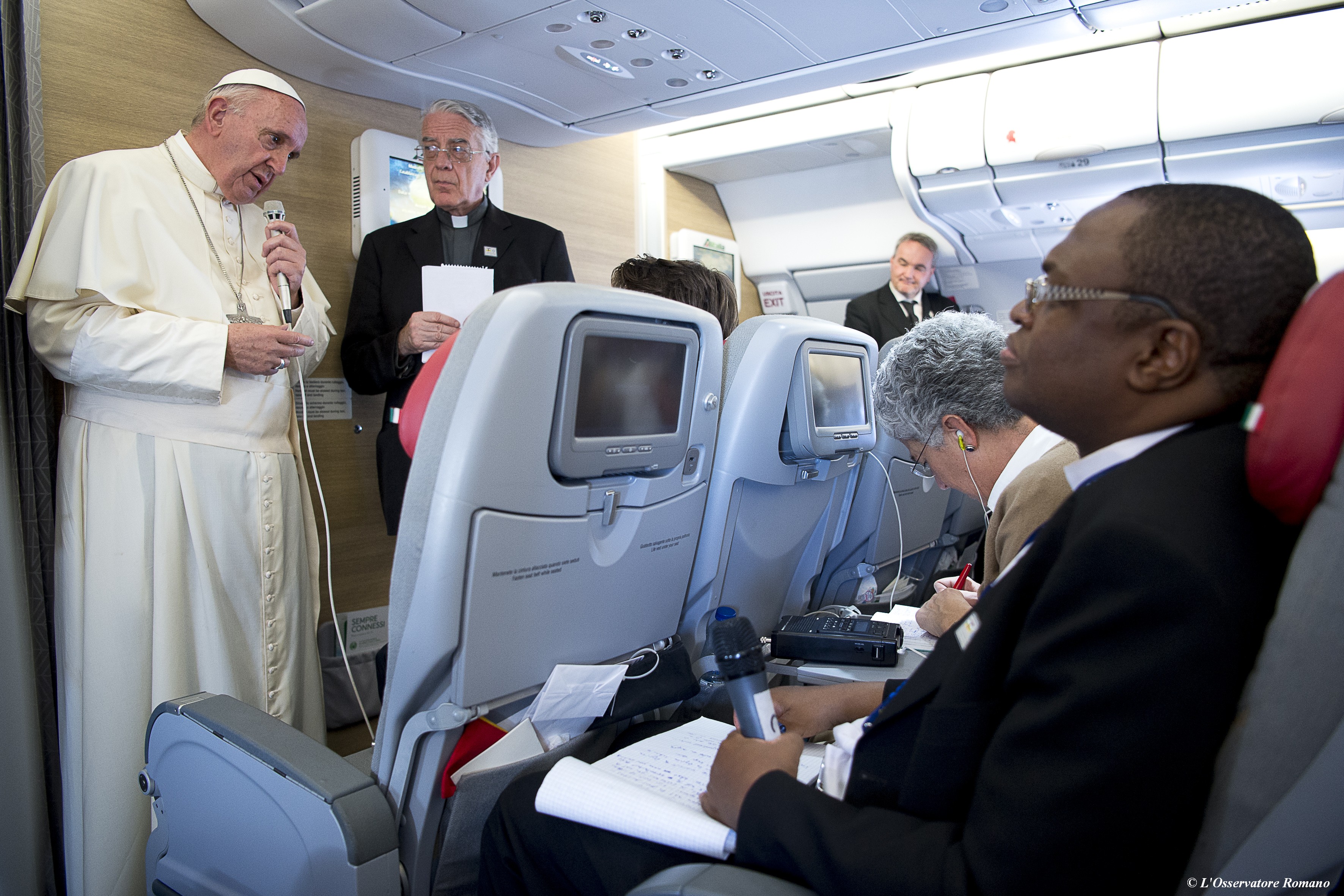Apostolic visit
Reading between the lines Pope Francis’ words during the traditional in-flight press conference back to Rome. There are several emphases that are worthwhile highlighting. Reading between the lines the words delivered by Pope Francis during the traditional in-flight press conference back to Rome with journalists, emerge several significant emphases, that are worthwhile highlighting.

First of all, there emerges the Pope’s intention to further ecumenical and interreligious dialogue. Then, responding to a question on the historic meeting with Patriarch Kirill ,Francis mentioned also the complex sphere of the relations between Moscow and Ukraine. The Pan-Orthodox Conference, due to take place in Crete next June, will be an opportunity for a new step on the road leading to t full unity. Delegates from the Catholic Church have been invited as special observers, the Pope will be present with a message. “I will be present”, through the Vatican delegates, “with prayers and my best wishes that the Orthodox move ahead. They are brothers and their bishops are bishops like us.. Cyril is my brother, we kissed each other and embraced.” Francis reminded journalists of the long two-hour conversation at Cuba’s airport, during which they spoke as brothers about the situation of the two Churches.
But it adds nothing more to the words he had already told us journalists during the flight from Cuba to Mexico, almost as if to protect a process which, in its quest for dialogue, may bring about the end of the divisions between the two Churches, that it needs silence more than words, prayer more than speeches.
This answer encompasses two concerns: the first is addressed to Greek-Catholics and to the statements of the Major Archbishop of Kiev Sviatoslav Schevchuk, whom Francis knows well for having worked with him for four years in Buenos Aires, and to the possibility of a trip to Moscow. As regards the statement of the Ukrainian Archbishop, Francis highlighted most of all the aspect of the union with Rome, analysing Archbishop’s words in the light of the conflict between Russia and Urkaine. He said: it’s a time of war and suffering; reminding journalists that “I have expressed my closeness to the Ukrainian people” on many occasions. Then, to clarify his point, he added that the – “debatable” – document, calls to stop the war with Ukraine and move forward the Minsk agreement signed in 2014, “without erasing with the elbow what was written by the hand.” As for the visit that was a dream for Pope Wojtyla and a hope for Benedict XVI, Francis is even more prudent, to avoid disrupting a difficult balance and a subtle opportunity. He said: “I would prefer that what we spoke about, us, alone, will remain only what we said in public… But, I tell you, I walked out of it happy, and he did too.”
As regards interreligious dialogue the focus shifted to Cairo and to the proposal advanced by a number of journalists regarding the possibility of a meeting with the great Sunni Imam of Al Azhar University, after years of interrupted relations with the Vatican. During the in-flight interviews the Pope said: “I want to meet him. I know that he would like it. We are looking for the way, always through Cardinal Tauran (President of the Pontifical Council for Interreligious Dialogue) because it is the path, but we will achieve it.”
The relationship with politics is another aspect of the Pope’s in-flight interview that deserves being highlighted. In 2013, in a meeting with the bishops of the Italian Bishops’ Conference the Pope said that issues regarding the relations with the political realm and with the Italian government were in their hands. He reiterated this point speaking with journalists. However, he also added:
All Catholics engaged in the political realm must be aware of their choices, and their decisions must be inspired by a “well-formed conscience”, he said answering a question on the position that Catholic parlamentarians are called to take on the law on registered partnerships
This step has already been made in other Countries, Francis said, but Catholic parliamentarians must vote according “to their well-formed conscience, and not the conscience of what seems to me.”
Finally, a last point deserves to be mentioned: the family and the question of the sacraments to remarried divorcees. There have been two Synods, Francis recalled, separated by a year of work. With his typical naturalness, Francis said that the post-synod document picks up on everything the synod spoke about the conflicts, wounded families and the pastoral of wounded families.
All of this refers to the major theme of preparation for marriage. Francis pointed out: to become a priest there are eight years of study and preparation, and then if you can’t do it, you can ask for a dispensation. “But to make a sacrament (marriage), which is for your whole life, only three to four meetings”, the Church has not considered this aspect. So he reiterated a key phrase used in the Synod, which is “to integrate.” For Francis it is a question of integrating wounded families in the life of the Church. From these lenses can also be read the question of remarried divorcees. Far from being an “award” it’s a work towards integration, all doors are open, but we cannot say, “from here on they can have Communion. This would be an injury also to all marriages and it would prevent them from undertaking the journey of integration.”
“If there is something more”, the Pope said, “the Lord will tell them, but it’s a path, a road.”